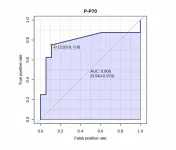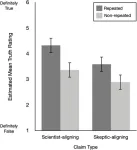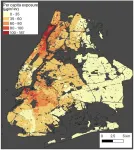(Press-News.org) CORNELL UNIVERSITY MEDIA RELATIONS OFFICE
FOR RELEASE: August 7, 2024
Kaitlyn Serrao
607-882-1140
kms465@cornell.edu
When is too much knowledge a bad thing?
ITHACA, N.Y. – A new study finds an increase in knowledge could be a bad thing when people use it to act in their own self-interest rather than in the best interests of the larger group.
Cornell University economics professor Kaushik Basu and Jörgen Weibull, professor emeritus at the Stockholm School of Economics, are co-authors of “A Knowledge Curse: How Knowledge Can Reduce Human Welfare,” published Aug. 7 in Royal Society Open Science.
According to the pair, even for a group of rational individuals, greater knowledge can backfire. And, they said, enhanced knowledge about an existing reality – such as the cost-benefit of wearing a face mask to help prevent the spread of disease – may hinder cooperation among purely self-interested individuals.
“We assume that a scientific breakthrough that gives us a deeper understanding of the world can only help,” said Basu. “Our paper shows that in the real world, where many people live and strive individually or in small groups to do well for themselves, this intuition may not hold. Science may not be the panacea we take it to be.”
Basu and Weibull build the case – with modeling in a theoretical two-player Base Game – that the “knowledge curse” can happen if, at first, only a few people are privy to the greater knowledge.
In the Base Game, each player has two actions to choose from. There are four combinations of actions, each with expected payoffs to both players. Each player chooses to maximize their own payoff.
However, if another set of options is added that introduces the chance that the other player would get nothing, along with an option of a very small payoff for both, the mutual small reward becomes more appealing – a form of the Prisoner’s Dilemma, in which two “prisoners” can either cooperate for mutual benefit or betray their partner for individual reward. In other words, more “knowledge” can lead to worse overall outcomes.
The paper goes further and shows that a scientific breakthrough that does not add any new option but simply deepens the players’ understanding of the payoffs and their fluctuations can make the players worse off.
The authors extend their theoretical calculations into real-world dilemmas, such as crafting policy without knowing the full contours of a problem. The drafting of a nation’s constitution, for instance, must anticipate and address problems likely to occur well into a future with unknowable sets of circumstances. “Such preemptive laws have conferred large benefits to humankind,” the authors wrote.
“By drawing attention to this paradoxical result,” Basu said, “the paper urges policymakers and even the lay person to think of preemptive actions, agreements and moral commitments that we as human beings should take and make to avert disasters that future scientific advances can cause.
“Science can yield huge benefits, but we need safeguards,” he said. “What those are, we do not know. But the paper urges us to pay attention to this.”
Funding for this research came from the Jan Wallander and Tom Hedelius Foundation.
For additional information, read this Cornell Chronicle story.
Cornell University has dedicated television and audio studios available for media interviews.
-30-
END
When is too much knowledge a bad thing?
2024-08-07
ELSE PRESS RELEASES FROM THIS DATE:
Do smells prime our gut to fight off infection?
2024-08-07
Many organisms react to the smell of deadly pathogens by reflexively avoiding them. But a recent study from the University of California, Berkeley, shows that the nematode C. elegans also reacts to the odor of pathogenic bacteria by preparing its intestinal cells to withstand a potential onslaught.
As with humans, nematodes’ guts are a common target of disease-causing bacteria. The nematode reacts by destroying iron-containing organelles called mitochondria, which produce a cell's energy, to protect this critical element from iron-stealing bacteria. Iron is a key catalyst in many enzymatic reactions in cells — in particular, ...
mTORC1 in classical monocytes: Links to human size variation & neuropsychiatric disease
2024-08-07
"This report suggests that a simple assay may allow cost-effective prediction of medication response."
BUFFALO, NY- August 7, 2024 – A new research paper was published in Aging (listed by MEDLINE/PubMed as "Aging (Albany NY)" and "Aging-US" by Web of Science), Volume 16, Issue 14 on July 26, 2024, entitled, “mTORC1 activation in presumed classical monocytes: observed correlation with human size variation and neuropsychiatric disease.”
In this new study, researchers Karl Berner, Naci Oz, Alaattin Kaya, Animesh Acharjee, and Jon Berner ...
In Parkinson’s, dementia may occur less often, or later, than thought
2024-08-07
MINNEAPOLIS – There’s some good news for people with Parkinson’s disease: The risk of developing dementia may be lower than previously thought, or dementia may occur later in the course of the disease than previously reported, according to a study published in the August 7, 2024, online issue of Neurology®, the medical journal of the American Academy of Neurology.
“The development of dementia is feared by people with Parkinson’s, and the combination of both a movement disorder and a cognitive disorder can be devastating to them and their loved ones,” said study author Daniel Weintraub, MD, ...
Impact of drought on drinking water contamination: disparities affecting Latino/a communities
2024-08-07
Long-term exposure to contaminants such as arsenic and nitrate in water is linked to an increased risk of various diseases, including cancers, cardiovascular diseases, developmental disorders and birth defects in infants. In the United States, there is a striking disparity in exposure to contaminants in tap water provided by community water systems (CWSs), with historically marginalized communities at greater risks compared to other populations. Often, CWSs that distribute water with higher contamination levels exist in areas that lack adequate public infrastructure or sociopolitical and financial resources.
In ...
Pesticide exposure linked to stillbirth risk in new study
2024-08-07
Living less than about one-third of a mile from pesticide use prior to conception and during early pregnancy could increase the risk of stillbirths, according to new research led by researchers at the Mel and Enid Zuckerman College of Public Health and Southwest Environmental Health Sciences Center.
Researchers found that during a 90-day pre-conception window and the first trimester of pregnancy, select pesticides, including organophosphates as a class, were associated with stillbirth.
The paper, “Pre-Conception ...
Individuals vary in how air pollution impacts their mood
2024-08-07
Affective sensitivity to air pollution (ASAP) describes the extent to which affect, or mood, fluctuates in accordance with daily changes in air pollution, which can vary between individuals, according to a study published August 7, 2024 in the open-access journal PLOS ONE by Michelle Ng from Stanford University, USA, and colleagues.
Individuals’ sensitivity to climate hazards is a central component of their vulnerability to climate change. Building on known associations between air pollution exposure and ...
Repetition boosts belief in climate-skeptical claims, even among climate science endorsers
2024-08-07
Climate science supporters rated climate-skeptical statements as “truer” after just a single repetition, according to a study published August 7, 2024 in the open-access journal PLOS ONE led by Mary Jiang from The Australian National University, Australia, and coauthored by Norbert Schwarz from the University of Southern California, USA, and colleagues. The results held true even for the strongest climate science supporters surveyed.
Amidst the influx of content that a person consumes each day, the principle of motivated ...
Study quantifies air pollution for NYC subway commuters
2024-08-07
New York City subway commuters who are economically disadvantaged or belong to racial minority groups have the highest exposure to fine particulate matter during their commutes, according to a new study published August 7, 2024 in the open-access journal PLOS ONE by Shams Azad of New York University, USA.
Fine particulate matter (PM2.5) is a type of air pollution that, due to its small size, when inhaled by a person can enter the bloodstream. PM2.5 is known to cause short- and long-term health complications. For the last few decades, cities have promoted public transportation to reduce traffic congestion and improve ambient outdoor air quality. Subway systems reduce pollution by decreasing ...
TikTok videos glamorizing disordered eating behavior and extremely thin body image ideals make women feel worse about their bodies
2024-08-07
Women who spend a lot of time on TikTok — especially those seeing a lot of pro-anorexia content — feel worse about their appearance, a new study shows. The results suggest that high TikTok exposure could harm mental health, reducing body image satisfaction and increasing the risk for disordered eating behavior. Madison Blackburn and Rachel Hogg from Charles Sturt University in Australia present these findings in the open-access journal PLOS ONE on August 7, 2024.
Since its launch, the short-form video app TikTok has had more than 2 billion downloads. The app’s algorithm curates content on a “For ...
Work-from-home success might depend on home office setup
2024-08-07
In a new survey study, Dutch employees who worked from home tended to report higher levels of productivity and less burnout if they were more satisfied with their home office setup. The study also linked more air ventilation in the home office to higher self-reported productivity. Martijn Stroom and colleagues at Maastricht University in the Netherlands report these findings in the open-access journal PLOS ONE on August 7, 2024.
In recent years, thanks in large part to the COVID-19 pandemic and technological advancements, ...








